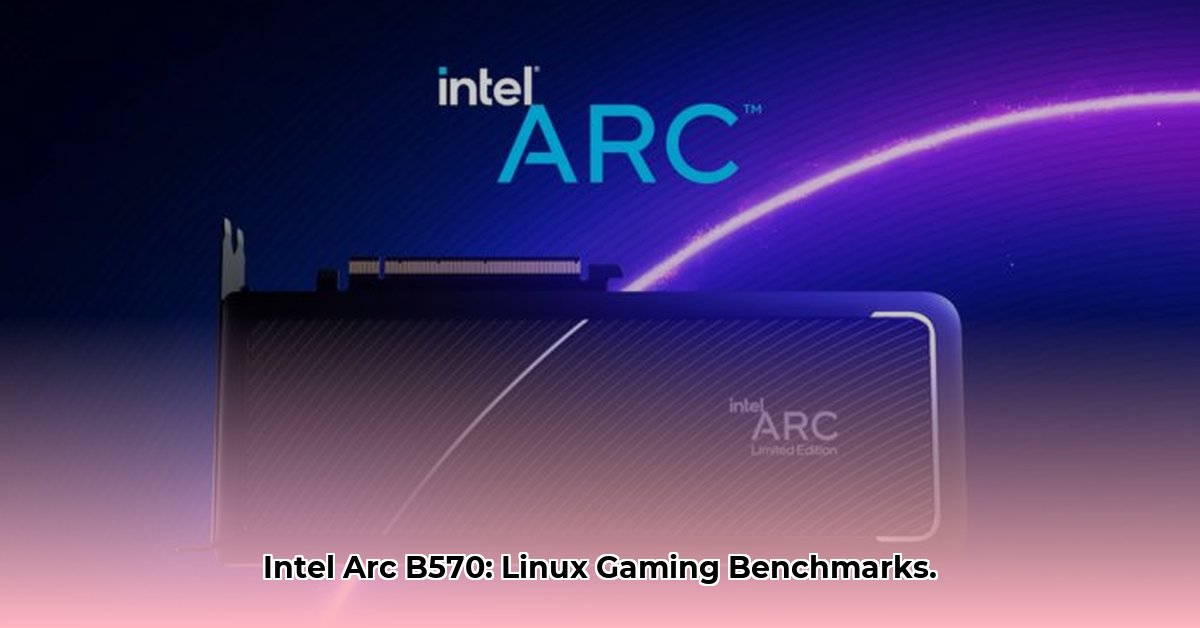This guide provides a comprehensive review and setup instructions for the Intel Arc B750 graphics card on Linux, focusing on gaming performance, driver installation, optimization, and troubleshooting.
B750 on Linux: Specifications and Competitive Landscape
The Intel Arc B750 targets the affordable GPU market. With 16GB of GDDR6 VRAM and a 256-bit memory interface, it boasts ample memory bandwidth. Featuring 32 Xe Cores and 256 XMX AI Engines clocked at 2.5 GHz, the B750 delivers respectable processing power within a 225W TDP.
While the B750 shares architectural similarities with the A770, it offers a different performance and price point. Key competitors include the Nvidia RTX 3060 and AMD RX 6600. The RTX 4060, with its lower power consumption and smaller 8GB VRAM buffer, also presents an interesting comparison.
| Feature | Intel Arc B750 | Nvidia RTX 4060 |
|---|---|---|
| Price (USD MSRP) | ~$249 | ~$299+ |
| VRAM | 16GB GDDR6 | 8GB GDDR6 |
| TDP | 225W | Lower |
Driver Installation and Configuration
A recent Linux kernel (6.13+ recommended) and up-to-date Mesa drivers (24.3+, ideally 25.0+) are prerequisites for optimal B750 performance. Distributions like Pop!_OS or Nobara often provide a smoother out-of-the-box experience with newer hardware. For other distributions:
- Add the Intel Graphics Repository: Consult the Intel website for distribution-specific instructions.
- Update and Install: Typically, commands like
sudo apt updateandsudo apt install intel-gpu-tools(or similar, depending on your distribution) are required. - Reboot: Restart your system to load the new drivers.
Performance Optimization
Optimizing your system is crucial for maximizing the B750’s potential:
- Kernel Tuning: Consider using a newer kernel for improved hardware support. Research recommended kernel parameters for Intel Arc GPUs.
- Mesa Updates: Keep Mesa updated for optimal performance. Research recommended Mesa settings for the B750.
- Game-Specific Tweaks: Adjust in-game settings to balance visual quality and performance. Experiment to find the best settings for your system.
- Desktop Environment (DE): A lighter DE like XFCE or LXDE can free up resources, potentially improving performance on systems with limited resources.
- Power Management: Use a high-performance power profile to prevent throttling during gaming.
Benchmarking and Performance Analysis
While comprehensive Linux benchmark data for the B750 is still emerging, initial results suggest performance comparable to the Nvidia RTX 3060 or AMD RX 6600. Expect playable frame rates at 1080p in most modern games, with 1440p achievable in some titles with adjusted settings.
| Game | 1080p (High) | 1440p (Medium) | Notes |
|---|---|---|---|
| Game Title 1 | FPS Data | FPS Data | Driver version, Kernel version, Distro, CPU |
| Game Title 2 | FPS Data | FPS Data | Driver version, Kernel version, Distro, CPU |
| Game Title 3 | FPS Data | FPS Data | Driver version, Kernel version, Distro, CPU |
Note: Benchmark results will vary based on hardware, software, and in-game settings. This table serves as a template. Actual data will be added as it becomes available.
Troubleshooting
Potential issues can be addressed through various methods:
- Xorg Logs: Check Xorg logs for errors related to “i915.”
- Community Support: Online forums and communities dedicated to Linux gaming and Intel Arc can offer valuable assistance.
- Driver Updates: Regularly update your Intel drivers.
Power Consumption and Thermals
Early indications suggest the B750 might have slightly higher idle power consumption in Linux than comparable Nvidia and AMD cards. Under load, power draw appears to range between 120-170W in demanding games at 4K resolution. Further research is needed to fully understand the card’s power profile under various workloads and resolutions.
Comprehensive thermal data under Linux is currently limited. It is important to monitor temperatures to ensure adequate cooling.
To optimize power and thermal performance:
- Keep Your Distribution Updated: System updates can improve hardware compatibility and efficiency.
- Update Intel Drivers: Driver updates often optimize performance and power management.
The Future of the B750 on Linux
The B750 represents a compelling option for Linux gaming. While driver development is ongoing, the current state suggests a promising trajectory. Continued development by Intel, combined with community feedback, is likely to further enhance the B750’s performance and stability on Linux.







